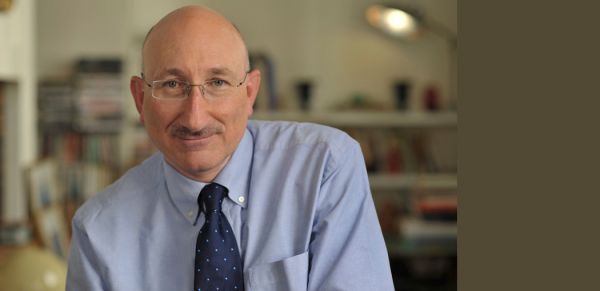The Rebel Academic: The Life and Work of David Cesarani (Summary)
The Rebel Academic: The Life and Work of David Cesarani
Sara and Asa Shapiro Scholar Symposium on Jewish History and the Holocaust

The USC Shoah Foundation Center for Advanced Genocide Research organized a symposium in the Fall to honor the work of leading Holocaust scholar David Cesarani from Great Britain, who died just weeks after being named by the USC Shoah Foundation the inaugural Sara and Asa Shapiro Scholar in Residence. The symposium featured international scholars David Silberklang and Rob Rozett (both at Yad Vashem) and Todd Endelman (University of Michigan), who discussed Cesarani’s work, his impact on Holocaust studies, and the connections between their own work and his contributions to the field. The symposium allowed those in attendance to honor Cesarani’s legacy and celebrate his life. Cesarani’s wife Dawn and their children Daniel and Hannah were guests at the symposium and visitors to the USC Shoah Foundation during their weeklong stay in Los Angeles.
The founding director of the Center, Wolf Gruner, served as moderator for the symposium, and after some introductory remarks, he introduced Stephen Smith, Executive Director of the USC Shoah Foundation, who shared reflections on his 20-year friendship with David Cesarani. He described Cesarani’s academic curiosity, his wit, and his commitment to finding the right course through very complex issues. Smith said he learned from Cesarani that as an intellectual, one does not need to cloister oneself away. Cesarani never shied away from putting his name on the line and, as a result, made lasting contributions in his public life and in his work.
Rob Rozett spoke next. He discussed many aspects of the wide scope of Cesarani’s intellectual work, as well as Cesarani’s knowledge about areas other than history that he expressed in his life and in his friendships. Rozett then focused on several of the deep resonances between Cesarani’s work and his own research, particularly a recently published anthology of Holocaust survivors’ letters written early after liberation that Rozett co-edited. You can read Rozett’s remarks here.
Todd Endelman’s remarks focused on Cesarani’s contributions to the field of Anglo-Jewish history, which is the area in which Cesarani launched his career as a historian. Cesarani intervened into a historiography that had depicted Anglo-Jewry as homogeneous and stable. Cesarani illuminated the tensions in Anglo-Jewish life, such as the impact of anti-Semitism. Cesarani felt that anti-Semitism and prejudice had been downplayed or diminished, but it was pervasive, Cesarani argued. The animosity against Jews in Britain may have been hushed or well-mannered, but it was consequential. At the time Cesarani wrote about this, this view was quite radical, Endelman explained, but it has since become far more accepted. Endelman detailed how Cesarani contributed to shaping the field of Anglo-Jewish history before moving on to research and write about the Holocaust. Despite exercising his talents in larger arenas and wrestling with profound issues, Cesarani never lost connection to Anglo-Jewish history, Endelman argued, and returned to it in the last 10 years. For example, in his book about Disraeli published after his death, Cesarani demolished the Anglo-Jewish claim that Disraeli was a proud Jew. Concluding his remarks on a personal note, Endelman described Cesarani as the most stimulating and liveliest interlocutor he has ever had.
David Silberklang spoke last. He began by describing Cesarani as an outstanding scholar and a great friend. Cesarani read widely and voraciously, and remembered everything he read, Silberklang said. Whatever forms his work took, Cesarani was always deeply attuned to victims’ voices and experiences. Silberklang described how exhilarating it was to discuss history with Cesarani. Silberklang then presented more detail of how his own research is tied to Cesarani's work, notably in integrating a wide variety of sources and putting Jewish voices at the heart of the research. You can read Silberklang's remarks here.
As expressed by all the scholars, David Cesarani leaves behind an enormous legacy -- as a prolific researcher and author, a rigorous and lively interlocutor, and a cherished friend. Two of his books have been published posthumously: Final Solution: The Fate of the Jews 1933-49 and Disraeli: The Novel Politician. The Center was honored to host this symposium that allowed people to reflect on and pay tribute to the breadth, depth, and significance of David Cesarani’s life and work.
Read Rob Rozett's remarks here.
Read David Silberklang's remarks here.
Summary by Martha Stroud